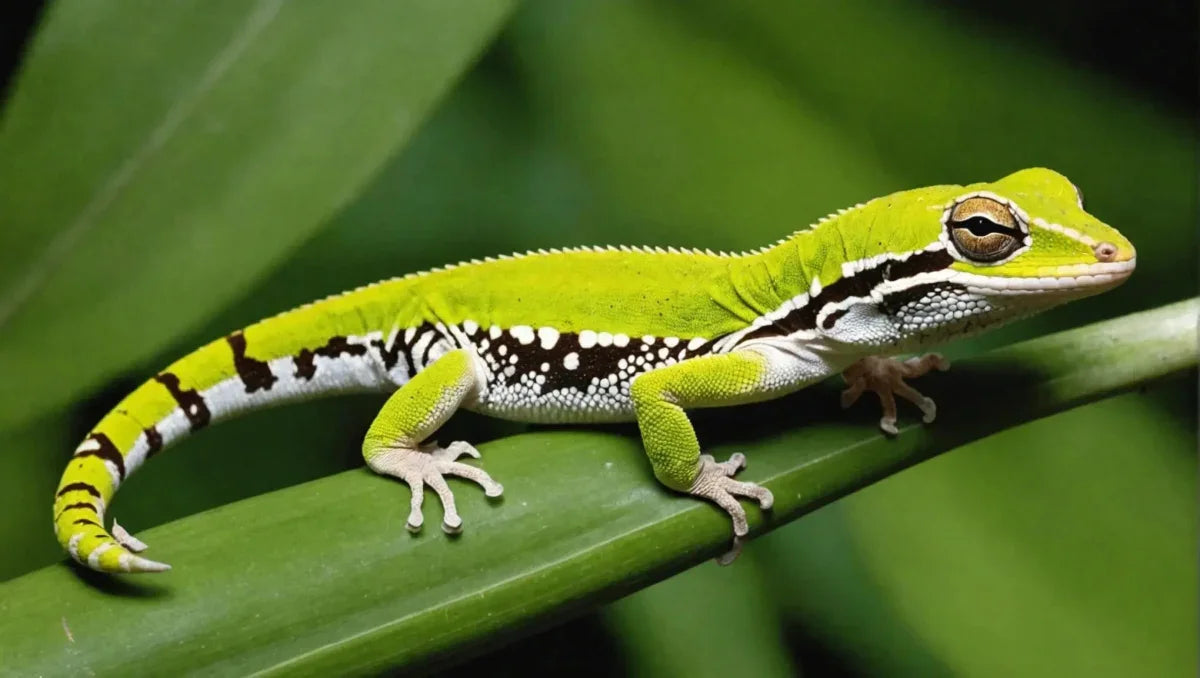Welcome to the fascinating world of vegetarian geckos!

These herbivorous lizards, known for their unique dietary preferences, offer a captivating insight into the diversity of reptilian life. As we delve into the realm of these leaf-munching creatures, we will uncover the reasons behind their plant-based diets, explore the variety of foods that sustain them, and learn about the special care they require to thrive in captivity. Whether you are a seasoned reptile enthusiast or simply curious about these unconventional reptiles, this guide will provide you with valuable information and tips to better understand and appreciate the vegetarian geckos. Get ready to embark on a journey through the green landscapes of vegetarian geckos, where their colorful personalities and dietary habits are sure to leave you amazed!.
Dietary Needs of Vegetarian Geckos
Types of Plants in Their Diet
Vegetarian geckos require a variety of plants in their diet to meet their nutritional needs. Including leafy greens, fruits, and vegetables such as collard greens, dandelion greens, squash, and berries can provide essential vitamins and minerals. It's important to offer a diverse selection of plant-based foods to ensure they receive a well-rounded diet. Different plants offer different nutrients, so variety is key to meeting all their nutritional requirements.
Supplementation Requirements
In addition to a plant-based diet, vegetarian geckos may require supplementation to ensure they are receiving all necessary nutrients. Calcium powder, vitamin D3, and multivitamin supplements can help prevent deficiencies and promote overall health. It's crucial to follow recommended dosage guidelines and consult with a veterinarian specializing in exotic pets to tailor the supplementation plan according to your gecko's specific needs.
Common Mistakes to Avoid
When feeding vegetarian geckos, it's important to avoid certain mistakes that can impact their health. Some common errors include offering foods high in oxalates, feeding only one type of plant, or neglecting to provide proper supplementation. High oxalate foods like spinach can bind calcium and hinder its absorption, leading to potential health issues. Additionally, a lack of variety in their diet can result in nutrient deficiencies. Always research and ensure the plants you offer are safe and nutritious for your gecko. Regularly review and adjust their diet based on their health and needs to maintain their well-being.
Meeting the dietary needs of vegetarian geckos requires a balance of plant diversity, proper supplementation, and avoiding common feeding mistakes. By providing a varied diet rich in essential nutrients and monitoring their health closely, you can support your gecko's overall health and longevity.
Additional Tips for Feeding Vegetarian Geckos
- Gut Loading Insects: If your gecko consumes insects as part of their diet, ensure the insects are gut-loaded with nutritious foods to pass on those benefits to your gecko.
- Offering Calcium-Rich Foods: Incorporate calcium-rich plants like kale, broccoli, and figs to help maintain their bone health and prevent calcium deficiencies.
- Hydration: Apart from their diet, provide a shallow water dish for geckos to drink from, as hydration is essential for their well-being.
- Avoiding Toxic Plants: Be cautious of offering plants that are toxic to geckos, such as ivy, certain lilies, and philodendron. Research thoroughly before introducing new plants into their diet.
Ensuring a well-rounded and nutritious diet for vegetarian geckos is vital for their health and longevity. By following these guidelines and continuously educating yourself on their dietary requirements, you can provide the best care for your beloved gecko.
Caring for Vegetarian Geckos
Habitat Setup
Proper habitat setup is crucial for the overall health and happiness of vegetarian geckos. A spacious terrarium with adequate ventilation is essential to mimic their natural environment. Ensure the terrarium has a substrate that retains moisture well, such as coconut fiber or peat moss. Vegetarian geckos also benefit from a variety of hiding spots, such as cork bark or half logs, to provide security and reduce stress. Adding artificial or live plants not only enhances the aesthetic appeal but also offers enrichment and places for geckos to explore.
Feeding and Nutrition
Vegetarian geckos have specific dietary requirements that need to be met for their well-being. A balanced diet rich in fruits, vegetables, and commercially available gecko diets is essential. Leafy greens like collard greens, kale, and mustard greens are excellent choices. Fruits such as papaya, mango, and figs can be offered as treats. It's important to dust their food with calcium and vitamin supplements to prevent nutritional deficiencies.
Handling and Interaction Tips
When it comes to handling vegetarian geckos, it's important to approach them with caution and gentleness. Geckos have delicate skin that can tear easily, so avoid excessive handling. If you need to pick them up, do so gently and support their body properly. Remember to wash your hands before and after handling to prevent the transfer of any harmful substances. Interacting with your gecko daily by talking to them or sitting near their terrarium can help build trust and familiarity.
Health Considerations
Regular health check-ups are essential to ensure your vegetarian gecko remains in top condition. Keep an eye on their weight, skin condition, and behavior. Any signs of lethargy, loss of appetite, or abnormalities should be addressed promptly. Provide a warm basking spot and a cooler area in the terrarium to allow them to regulate their body temperature. In case of any health concerns, consult a reptile veterinarian who has experience with geckos.
Caring for vegetarian geckos requires attention to detail and dedication. By creating a suitable habitat, providing a nutritious diet, handling them with care, and monitoring their health regularly, you can ensure a happy and healthy life for your gecko companion.
Benefits of Having Vegetarian Geckos
The Educational Value of Vegetarian Geckos
Owning vegetarian geckos offers a remarkable educational experience. These geckos, commonly known as 'Leaf-tailed Geckos' due to their striking leaf-like appearance, provide a unique opportunity for learning and exploration. By closely observing their behavior, understanding their dietary preferences, and creating a suitable habitat, enthusiasts can delve into the intricacies of the natural world. Their camouflage abilities and arboreal lifestyle make them captivating subjects for study, igniting curiosity and appreciation for the diverse ecosystems on our planet.
Low Maintenance Pets Perfect for All Ages
Vegetarian geckos are renowned for being low maintenance pets, making them ideal companions for individuals of all ages. Their simple dietary requirements primarily consist of fruits, vegetables, and specially formulated gecko food, reducing the complexities often associated with reptile care. These geckos do not demand elaborate heating or lighting arrangements, easing the burden on owners with busy schedules or those new to reptile ownership. Their gentle demeanor makes handling them a stress-free experience, enhancing the joy of pet ownership for families and enthusiasts alike.
Fostering a Deeper Connection with Nature
Welcoming vegetarian geckos into your home can cultivate a profound connection with nature. By tending to their needs and creating a naturalistic environment, owners can develop a heightened awareness of the environment and the delicate balance of ecosystems. Observing these geckos in their habitat-like enclosures serves as a daily reminder of the significance of preserving natural habitats and safeguarding biodiversity. Implementing a bioactive terrarium further enriches the experience, mimicking a self-sustaining ecosystem within a glass enclosure and promoting a deeper appreciation for the intricacies of nature.
Contributing to Conservation Efforts
Beyond their role as captivating pets, vegetarian geckos play a vital part in advancing conservation efforts. By embracing these gentle reptiles, owners actively participate in promoting responsible pet ownership and supporting conservation initiatives. Through firsthand interaction with these creatures, individuals become advocates for biodiversity conservation, fostering a sense of stewardship towards the environment. By integrating vegetarian geckos into your household, you not only gain delightful companions but also contribute to the educational awareness and preservation of ecological systems. Embrace the joys of caring for vegetarian geckos and witness the wonders of nature flourishing within your living space.
Conclusion
Vegetarian geckos can thrive on a herbivorous diet with proper care and attention to their nutritional needs. By understanding the dietary requirements and providing a variety of plant-based foods, reptile enthusiasts can successfully raise healthy and happy herbivorous lizards. Remember, consulting with a veterinarian specializing in exotic pets is always recommended to ensure the best possible care for vegetarian geckos.





